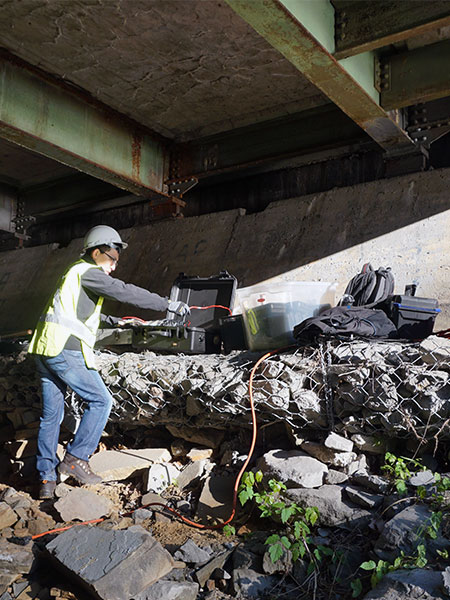Master of Science in Civil Engineering

The graduate programs from Drexel Engineering prepare professionals for applying required modern expanded skillsets in civil engineering. A civil engineering master’s degree helps professionals to address the continuing challenges placed on engineers relating to managing and retrofitting aging infrastructures, adopting new sustainable construction materials in constructed systems, designing, building and rendering the built environment resilient to climate change, addressing issues such as pollution, water and storm management and indoor and outdoor air quality.
Students gain knowledge of civil engineering science, with an emphasis on engineering design and scientific analysis, and emerging subjects in areas such as smart buildings, structural forensics and more. As a student, you will be empowered to solve complex issues encountered in transportation, infrastructure, structures, climate change and related fields. Learn about the advances in industry, gain a global viewpoint, build entrepreneurial and teambuilding skills needed to advance your career or graduate prepared for entry into a PhD program.
Delivery
- On-campus
- Full-time or part-time
- The MS in Civil Engineering degree will take two years to complete on a full-time basis or can be completed on a part- time basis in typically, 3-4 years.
Areas of Specialization
The civil engineering graduate degree provides flexibility to tailor study to your interests. The plan of study can encompass a broad range of technical knowledge or one that is more targeted to a specific concentration area. The following are some examples of topical areas for technical electives:
-
Geotechnical, geoenvironmental, geosynthetics engineering
Take on challenges with building on, in, or with soil, the most abundant construction material available. These principles are applied to an array of infrastructure projects such as structural foundations, roadway embankments and in land development and water resource facilities, as well as topics like the effects of water content and pressure on soil behavior and construction feasibility.
-
Structural engineering
Designs and uses advanced modeling tools to deal with the challenges of resilient complex structural systems and managing and retrofitting aging operating structural systems by adopting innovative durable and sustainable materials and components.
-
Water resource engineering
Creates systems and equipment that manages human water resources including water treatment facilities, underground wells and springs while maintaining water quality under the constraints of infrastructure, budget, regulations, and desired outcomes.
Curriculum and Requirements
- The master’s degree requires a total of 45 credits. Of these, 12 credits are cross-cutting interdisciplinary related courses and 12 credits are core courses related specifically to your focus area. The remaining credits are taken as electives or as a thesis.
- Full time master’s students are encouraged to pursue a thesis consisting of six research credits and three thesis credits.
Graduate advisors will consult with you on the choice and scheduling of core and elective courses. Visit the Drexel Catalog for more information or learn more about our admissions requirements.
About Drexel Engineering

The Civil, Architectural and Environmental Engineering (CAEE) Department is a leader in the field. The department places an emphasis on a a well-rounded education that has you emerge as a highly capable contributor on interdisciplinary teams, developing creative solutions and technological advances in the field. The focus of our program is to equip you with the tools for finding achievable outcomes to solve for society’s biggest challenges, while making them relevant to your career goals.
As a student, you will have access to Drexel’s university resources, and have access to conduct work in our well-equipped and professionally staffed geotechnical, material, mechanical and structural testing and environmental and air resources laboratories and have access to industry standard software in our computer labs. Learn more about our facilities.
Faculty
Drexel places a high value on industry connections and experience at every level. Teaching faculty in the CAEE department are experts with industry experience or are at the forefront of research and teaching.
Professor Amir Farnam along with professor Grace Hsuan developed aggregate material from coal combustion ash which make it ideal for mixing into concrete.
Amir Farnam, PhD CAEE
Philadelphia
The city of Philadelphia is our campus – a diverse urban environment with a variety of social, cultural and learning opportunities that will enrich your educational experience. Philadelphia is also a draw for talented instructors and researchers, meaning you will engage with some of the best minds in engineering and other disciplines. Learn more.
Research
All graduate students are encouraged to engage in research as part of their degree or as extra-curricular activity. Full-time master’s degree students are encouraged to base their master’s thesis on some aspect of faculty research. Research is sponsored by grants from many organizations including National Science Foundation (NSF), Federal Highway Administration (FHWA), Environmental Protection Agency (EPA), National Institute of Health (NIH) and a host of other institutions.
CAEE faculty research is always evolving, with a focus on areas that are of great importance in our society.
Visit research and design for more about other research activity at the College of Engineering.
Career Opportunities in Civil Engineering
Civil engineering graduate programs helps you advance your career pursuing advanced technical, research or management positions in industries such as those supporting infrastructure in government, engineering consulting, construction, water and wastewater utilities, transportation, and many others. Obtaining a MS in Civil Engineering will also prepare you for an advanced degree such as a PhD.
Overall, employees with graduate degrees can earn up to 28 percent more than bachelor’s degree holders over the course of their career. The outlook for civil engineering jobs is stable, with employment expected to grow at rate of 5% through 2034, faster than average according to the Bureau of Labor Statistics. Government spending on the aging infrastructure should rise as civil engineers will be needed to manage projects to rebuild, repair, and upgrade bridges, roads, levees, dams, airports, buildings, and structures of all types.
Apply Now Graduate Admissions Department Page